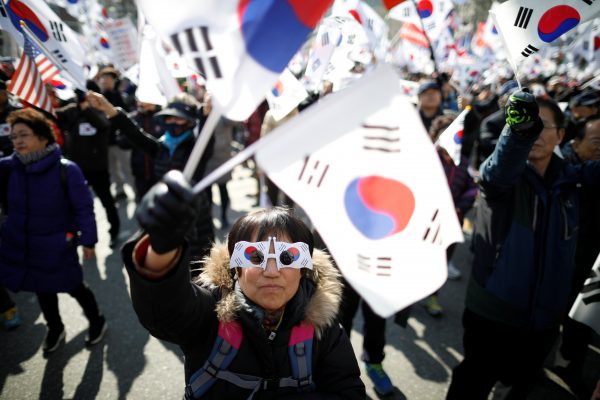The indictment of the recently-impeached Park Geun-hye on a total of 18 charges has big implications for South Korean democracy. This year marks the 30th anniversary of the country’s 1987 democratic constitution, a constitution whose flaws are now all too obvious. Five of the past six democratically elected presidents have fallen from grace, usually over corruption charges.
Besides Park — whose corruption trial began on 2 May and who has been indicted on a total of 18 charges, including the charge of either receiving or demanding $US52.1 million in bribes — one former president Roh Tae-woo was imprisoned for mutiny and bribery. Former presidents Kim Young-sam and Kim Dae-jung saw their sons imprisoned for receiving bribes and influence-peddling. President Roh Moo-hyun committed suicide amidst an investigation into a corruption scandal that involved his wife and children.
Yet South Korea is generally regarded as one of Asia’s most active democracies. The impeachment of Park was seen as an ‘historic milestone in the development of modern democracy across Asia’.
This accolade echoes the popular slogan ‘clean up old evils’ spouted regularly by South Korean presidential candidates — especially Moon Jae-in, front-runner from the left-wing Democratic Party of Korea (DPK) in the current race. Moon’s campaign slogan is about ‘changing unfair governance into a fair system’. The slogan aims to counter the pro-Park conservative forces which he has labelled ‘the old evil force’. Moon claims that, ‘[t]his presidential election is the one that will complete the ‘Candlelight Revolution’, a reference to the anti-Park candlelight protests by some 1.6 million Koreans.
Ahn Cheol-soo, co-founder of the centre-left People’s Party (PP) who has been running second in the polls, vows to form a coalition government by selecting the most talented people from across the political spectrum, including the main conservative Liberty Party Korea (LPK) and the newly created rival conservative Bareun Party (BP).
Park’s impeachment has set the context for a presidential contest in which two left-wing candidates, Moon and Ahn, dominate without any real threat from the conservative candidates. Park’s impeachment has totally divided the normally united conservative front for the first time in South Korea’s short democratic history. With a week to go before Tuesday’s election 13 BP lawmakers joined the LPK to support Hong Joon-pyo, whose popularity ranking has jumped to second alongside Ahn. Despite this sudden development, Moon’s lead in the Realmeter poll released last Wednesday sits at 42.4 per cent, over double his two nearest rivals.
The medium to longer-term implications of Park’s demise for political governance and constitutional reform are more difficult to predict. A number of former presidents — including Park, Roh and Lee Myung-bak — promised constitutional reform during their presidential campaigns. Some even proposed specific reform options such as a four-year two-term presidency, a semi-presidential system, or a cabinet system to replace the current five-year single-term presidency that dates back to the start of democracy under the 1987 constitution. None took any action.
Another reason for caution is that constitutional change needs the support of two-thirds of the National Assembly, plus a public referendum. These requirements will be tough to meet given the current national divide between the pro- and anti-Park blocs, even among conservatives. The new government, whoever grasps victory, will struggle to build the national consensus needed across the conflict-ridden political parties and the South Korean electorate to deliver long-debated constitutional and governance reform.
If Moon wins, he will face widespread hostility from conservative, older voters, particularly in the southeast region of Youngnam — the home-base of six former presidents including Park. In their eyes, Moon is unfit to lead South Korea because he is weak on security and is accused of being pro-North or even a ‘North Korean sympathiser’.
One good sign is that the presidential candidates of the five main parties have all publicly vowed with one voice to put a bill for constitutional amendment to a public referendum during next year’s provincial elections, expected to be held in May 2018.
Moon is promoting a four-year two-term presidency, whereas conservative LPK front-runner Hong prefers a decentralised cabinet system. Ahn of the center-left People’s Party opposes the cabinet system, weighing in behind a semi-presidential system with reduced presidential powers.
The presidential hopefuls have also vowed to shake up corporate governance. Both Moon and Ahn call for ‘radical reform’ through, for example, banning presidential pardons for powerful chief executives of chaebols (family-owned conglomerates).
Moves toward governance and constitutional reform under a new left-leaning government, however, could re-open deep political schisms, with conservatives bent on post-election vengeance.
Despite voters’ clamour for change to the way South Korean democracy works, there are quite a few hurdles on the way to delivering it.
Hyung-A Kim is an Associate Professor of Korean Politics at The Australian National University.

